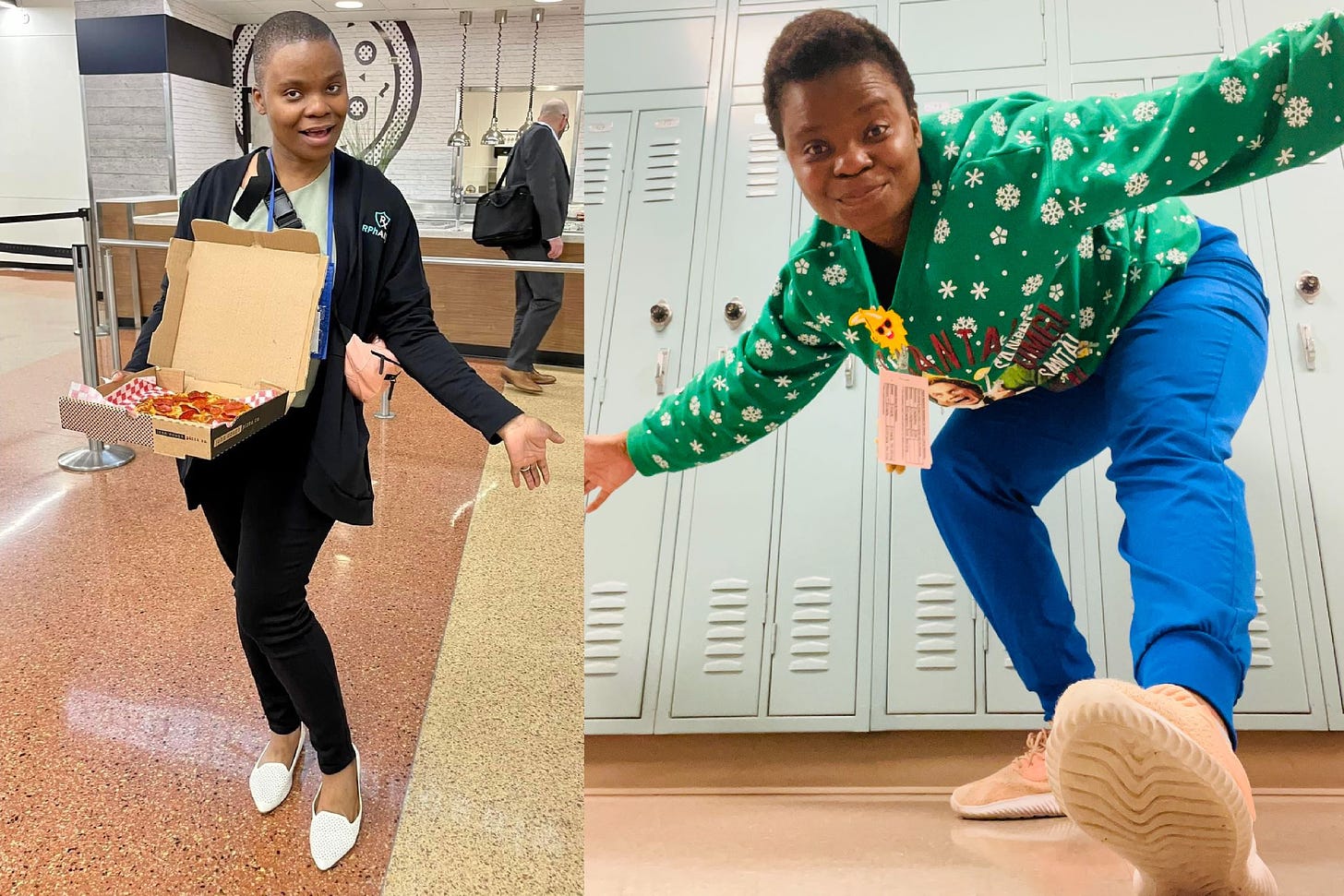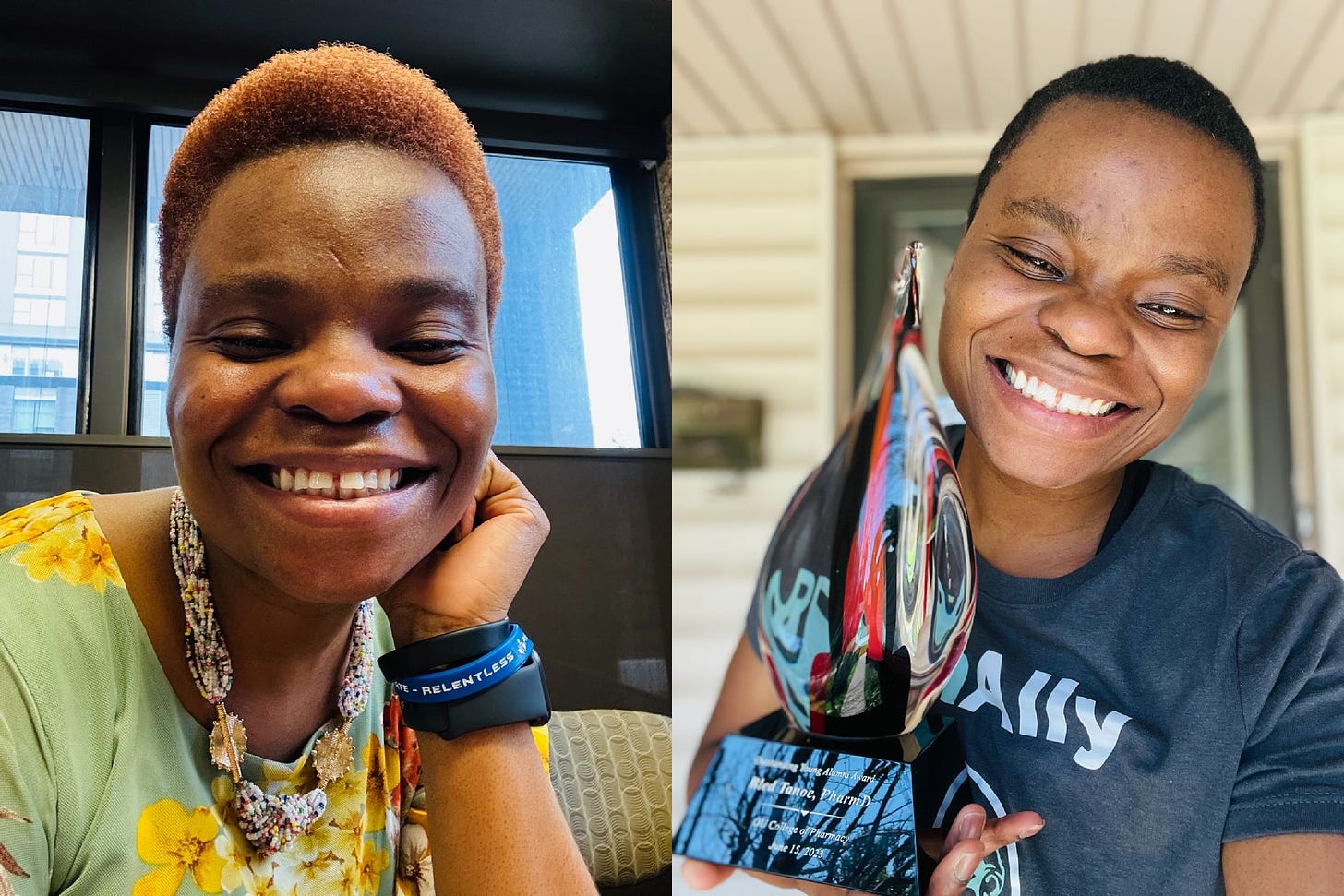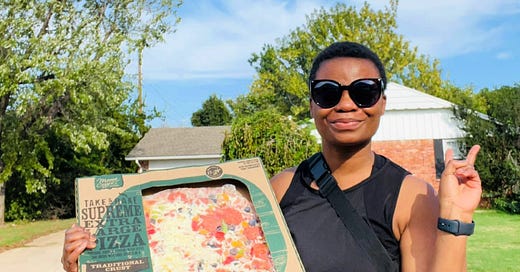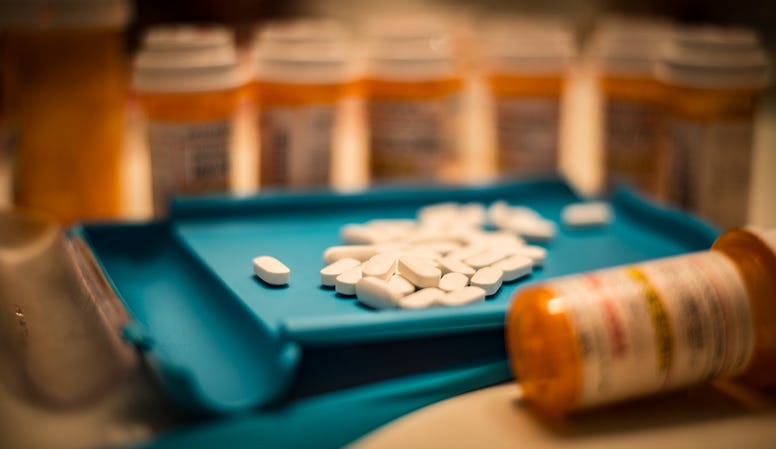Dr. Bled Tanoe Says Fix the Pharmacy, Forget the Pizza
Pharmacist advocate Dr. Bled Tanoe tells how she turned a hashtag into a national movement. Spoiler alert: It took guts, persistence, and a whole lot of effort.
“Yes, I love pizza, but it is no longer cutting it,” pharmacist Dr. Bled Tanoe wrote three years ago in an open letter to retail pharmacy upper management. “You can’t expect people to survive this amount of work with no help. We are drowning.”
What started as a 2021 Facebook post using the hashtag #PizzaIsNotWorking has grown into a nationwide movement. Relentless and steady, Bled’s been organizing walkouts, inspiring her followers, and challenging those in power—from retail pharmacy giants to professional organizations to national media—to PAY ATTENTION to the working conditions in retail pharmacies.
Bled is gutsy, honest, and full of heart. She doesn’t mince words but is open enough to let her warmth and vulnerability come through. She draws you in and makes you want to stay, chat, and become one of her thousands of pharmacy “Phriends.”
For the past several years, Bled has made the coveted list of “Most Influential Leaders in Pharmacy,” winning the top award in 2021. Lots of people in the pharmacy world admire Bled. She started a conversation, saying out loud what pharmacy workers have long been thinking, while building a permission structure for others to speak up too. And importantly, Bled’s putting to bed the notion that being a “good” healthcare professional means putting yourself and your needs absolutely last.
Dr. Tanoe holds a Bachelor’s degree in Chemistry from The University of Sciences and Arts of Oklahoma in Chickasha, Oklahoma and a Doctorate in Pharmacy from the University of Oklahoma. She lives in Oklahoma City with her husband and two children. Currently, Bled practices pharmacy in a hospital setting and serves as Vice President of RPhAlly.
In 2022, Bled authored her memoir, Surrendered Motherhood. Bled discussed her memoir and personal story in part one of the interview. Check it out!
"Surrendered Motherhood" author Bled Tanoe finds sweetness in every season
From NICU mom to fierce advocate, Dr. Bled Tanoe chronicles her arduous path to motherhood, finding splendor and renewed faith while caring for her beloved son, Daveed-Immanuel.
Our conversation below focuses on Bled’s pharmacy advocacy work.
This interview took place January 19, 2024. The transcript has been edited for length and readability.
Daphne: Do you feel like calling someone a hero is like buying them pizza?
Bled: It's very heavy to give someone this title, because it doesn't give them the space to make mistakes and be human. So I avoid calling people my hero.
I understand people who are watching me and say, “You know, you've done so much for the profession, thank you.” But I also feel like my fight or my voice isn’t really different from what people have done in the past, or even what people are doing today—silently fighting for themselves, or for the conditions, or for their co-workers within the workplace.
All I did is really to be in the open. I think all of us have a sense of being brave or having a sense of being a healer. So hero is a word that if I get, that’s great. That’s amazing. But I also hold it very lightly, you know, because tomorrow I might do something that might change your perception of me.
Daphne: How do you decide who you can trust in your advocacy work?
Bled: When I started #PizzaIsNotWorking, there were a lot of people who wanted to help and be in the know. Because of the magnitude of what I was doing, unless someone proved to be vocally public about this topic, I didn't let them in. So I chose very few people to tell what I was up to. Because you don't really know who to trust. It’s always a battle to decide—do I tell this person?
But now, several years into the making, I have a core group of pharmacists: Shane Jerominski, The Accidental Pharmacist, Maurice Shaw, Dr. of Comedy, Eric Geyer, The Political Pharmacist and a few others. Over the past few years, they never betrayed my trust. There is an element of knowing who you can reach out to and how to trust information that’s been given to you. That’s really important.
“If you want to get your message across to people who already have a different view, you have to shine the light on them."

Daphne: As higher-wage earners, pharmacists may be hesitant about speaking up. I’ve felt like that at times. But now I tend to feel that not talking about things can make things worse for everyone. What are your thoughts?
Bled: You know, when we first started this campaign, we were heavily focused on the physical and mental state of pharmacies and the public responded very poorly. It was the same issue—high wages, individual privilege—why are you complaining? And it was hard to get the message across even when the focus was on the pharmacy technicians.
I had to switch over the language and make it personal: So just imagine you just came from the dentist and you need your pain medication. But because of the stress level that we are under and the working conditions, it might take hours for me to get the script ready. How do you feel about that? Oh, no, that's not right. But again, because my employer is asking me to do so many tasks, I don't have time to do this for you. Now as a patient, I understand what you're telling me.
When we turned the conversation to talk about your antibiotics and your insulin, the public was more receptive. It’s not about you who makes sixty dollars an hour. It’s your employer who’s causing me not to get my prescription. The public started to see themselves in the issue. And then, the conversation started changing. CVS staff your pharmacists better. Walgreens your people are overworked.
We’re still talking about mental, physical and emotional struggles for pharmacists and pharmacy technicians, but we’re painting it in a way where the patient can see themselves in the story. So if you want to get your message across to people who already have a different view, you have to shine the light on them. That's what we like, because we are selfish individuals. And that's how we were able to get our message through.
Daphne: Working in a retail pharmacy is one of those jobs you can’t fully realize what it's like unless you do it. I’m curious, are you seeing any generational differences when it comes to accepting change? Or is that not a thing?
Bled: Even within our younger generation we’ve had people who felt like the working conditions aren’t an issue. And I definitely feel like the older generation feels there’s hope for the new generation, because there's been so much advocacy done for this generation compared to theirs. So many are like: I'm already going out, but I can stand behind and support you. And I think that's okay. Because they held us together and taught us.
I think the resistance to change tends to come from individuals who either don’t work in retail, or who work in retail but have a very good position—and that includes the new generation as well. So you have a mix of both.
Daphne: In any pharmacy setting, there’s stress. I only worked retail a short time, and it was the hardest job I've had. A big reason was being the only pharmacist in a public-facing setting. It seems like that’s some minimal thing that needs to change. What are your thoughts?
Bled: Absolutely. I mean, that's one thing I noticed when I switched to in-patient because I work in a bigger hospital. So we have more pharmacists and I can be like “Hey, I don't know what this is; what do you think?” There's an element of emotional support just to have another person there.
So that makes me wonder if the idea of having a single pharmacist in the chain pharmacy is meant to demoralize a person. Because I feel like it's so important that you have support in a high moment of stress. Someone that can tell you, “Hey, take a step back. I got this. You go eat. We’ll hold the ship together.” Otherwise you feel like you are scrambling, and there’s no one to say, “We can see all your stress. Just go take five. It’s okay.”
Daphne: I can’t think of another high-risk setting where you wouldn’t be partnered up like that. And there's no other healthcare profession so open to the public. You can't just walk into a medical office and ask a question. Having peer support is essential.
Bled: Absolutely.
“#PizzaIsNotWorking is like a free bird—it doesn't answer to anyone.”

Daphne: I came across your GoFundMe page to raise money so you can attend the 2024 American Pharmaceutical Association (APhA) meeting on behalf of your #PizzaIsNotWorking movement. You met your goal of covering travel expenses, but also pointed out you’re not seeking compensation for your time. I can only imagine how much time and energy you’ve given to this cause. It seems appropriate for you to be compensated for your time. How do you feel about that? And how can advocates be better supported?
Bled: People always ask me that. Why don’t you get paid for what you do? My sister tells me I need to hire someone. And I do have a full time job; I work as an inpatient pharmacist. Everything else stays on my own. But the reason why I stay away from monetary compensation is because I want to keep a sense of devotion to advocacy and a sense of sacrifice.
I'm not saying that people who get paid to advocate don’t sacrifice. Because regardless, you are sacrificing something. But personally, for me, I feel that if I'm doing this without having anyone write me a check for my time and effort, it makes it much more worth it to me.
And that's the only thing I ask is if I go to a conference, just pay my way there. Now if you want to randomly send me a gift, I won’t tell you no. But to be getting monthly income from the profession for doing this, that doesn't sit well with me.
Daphne: I understand. When money starts getting involved it can become unclear if your voice is your own. And do you have the freedom to speak your mind?
Bled: The beautiful thing is that #PizzaIsNotWorking is like a free bird—it doesn't answer to anyone. It's like the stepchild of every single association. You don't want it, but it's still there. And it does whatever it does. If something goes wrong, then okay. If something goes well—we all did it, you know. That's the beautiful thing about it.
And I think that’s why it’s been able to go this far. People expected #PizzaIsNotWorking would die in the first few months. But it didn’t have to respond to anyone. There was no board of directors preventing it from calling out APhA or CVS. There was no monetary attachment from anyone.
Daphne: It gives you more freedom to speak your mind without having strings attached.
Bled: Exactly.
Daphne: Looking at pharmacist statistics, Black and Latinx people remain largely underrepresented. Knowing how important representation is in healthcare—it truly is a public health issue—it’s hard to understand why this is the case in 2024. I know you hear from so many people and talk to so many, and of course have your own experiences. What are your thoughts about what will help bring more people of color into the pharmacy profession and into more leadership roles?
Bled: Honestly, I think we have watched so many Black leaders within corporations being promoted without being given the support they need. It brings the insult, Oh, we don't see color. DEI is a new favorite word, but in saying that, it also leaves the next generation to be very careful because of how people who have gone above them have been treated.
So I think outreach needs to start earlier in terms of providing the support to people of color to prepare them. Because there is a difference in culture in the way education is viewed when you're talking to people of color compared to white individuals—there's a difference.
And so first, learning those differences, and knowing how to address them from the very, very beginning instead of putting them in a position with no preparation and bringing them into a higher position—with again, not giving them the support to succeed. It’s almost like we have been used as an experiment.
Daphne: I think what you shared is very insightful, needs to be said—and more importantly listened to.
Bled: I am not only a woman, but I'm also Black and also a foreigner within our profession. I’ve been fighting on behalf of pharmacists of color, and also whites. And there's this element of the Black woman always being the one that is being sacrificed.
LinkedIn is a very interesting place. I love that it shows what people are sharing and the things they’re excited about. It also shows a parallel to differences. Like how many white pharmacists doing amazing things get recognized for their work by major organizations.
But for me, it’s a whole different story. My name is never spoken by an association. I’ve never received a letter saying we see your work. Or a thank you for using your voice. There’s only been public acknowledgement by individuals—but never by entities, you know what I mean? It’s just very complex.
“I’ve been fighting on behalf of pharmacists of color, and also whites. And there's this element of the Black woman always being the one that is being sacrificed.”

Daphne: I can only imagine the heaviness of experiencing that. Thank you for being so open and honest. What you created with #PizzaIsNotWorking is a permission structure to say: This is not okay—and it’s okay to talk about. You deserve formal recognition for that. If it were easy to do, it would’ve been done decades ago.
Bled: I tell people all the time, look how much work we've been able to do without having the backing of major entities in pharmacy—a lot. But look how much more we could be doing if we had their backing.
For instance, we’ve always been wanting to get the story on CNN. So when we found out APhA had a contact with CNN, so we asked if they would help us get a sitting. If APhA contacted CNN, that would have been a very easy route to make it happen. When Scott Knoer—the old CEO of APhA—was there, he connected us to the New York Times. I told him how helpful it would be for our work to get into a major publication. And that worked out.
On our own, we’ve been able to make connections with PBS NewsHour, USA Today, CBS and NBC news. But we didn’t get covered by CNN until we made the connection ourselves. But it’s like, if they had the connections that could aid so much in the process, why wouldn’t they share them?
Daphne: You have such conviction and clarity about making things better and finding a way forward, have you ever considered running for political office?
Bled: People ask me all the time. And I don't know if I would. I'm not really sure yet.
Daphne: Well, you've got plenty of time. Is there something else you’d like to do in the near term?
Bled: You know, I really, really wanted to be a board of pharmacy member. That was the thing that I really wanted to do when I started this. I worked in retail. I educated myself about PBMs (Pharmacy Benefit Managers). I also support public health. I’m not perfect, but I have a well-rounded understanding of what my duty would have been. But it was thought that I was too charged or too biased.
It's difficult to think about where I want to be in the future when so many positions that I aspired to have already been taken away. So when people tell me you have nothing to lose, I'm like yeah, you don't know that. Professional aspiration or getting a new position is difficult math for me to do.
Daphne: Well I think #PizzaIsNotWorking is just a start for you. You have so much future ahead. People calling you “too charged” shows their fear of change and that’s exactly why your leadership is needed on the board. Thank you so much for sharing your insight and experiences!
Related reading:
Dr. Tanoe was interviewed in this piece for the New York Times: Why Pharmacy Workers at CVS and Walgreens Are Protesting.
This past February, Emily Le Coz wrote a story for USA Today about the tragic loss of Ashleigh Anderson: “CVS pharmacist's death becomes cautionary tale of crushing stress at work.” Bled was interviewed for the piece, discussing the #SheWaited campaign.
Author
covered Dr. Tanoe’s advocacy work in a 2021 post on his newsletter BIG — “#PizzaIsNotWorking: Inside the Pharmacist Rebellion at CVS and Walgreens.”






